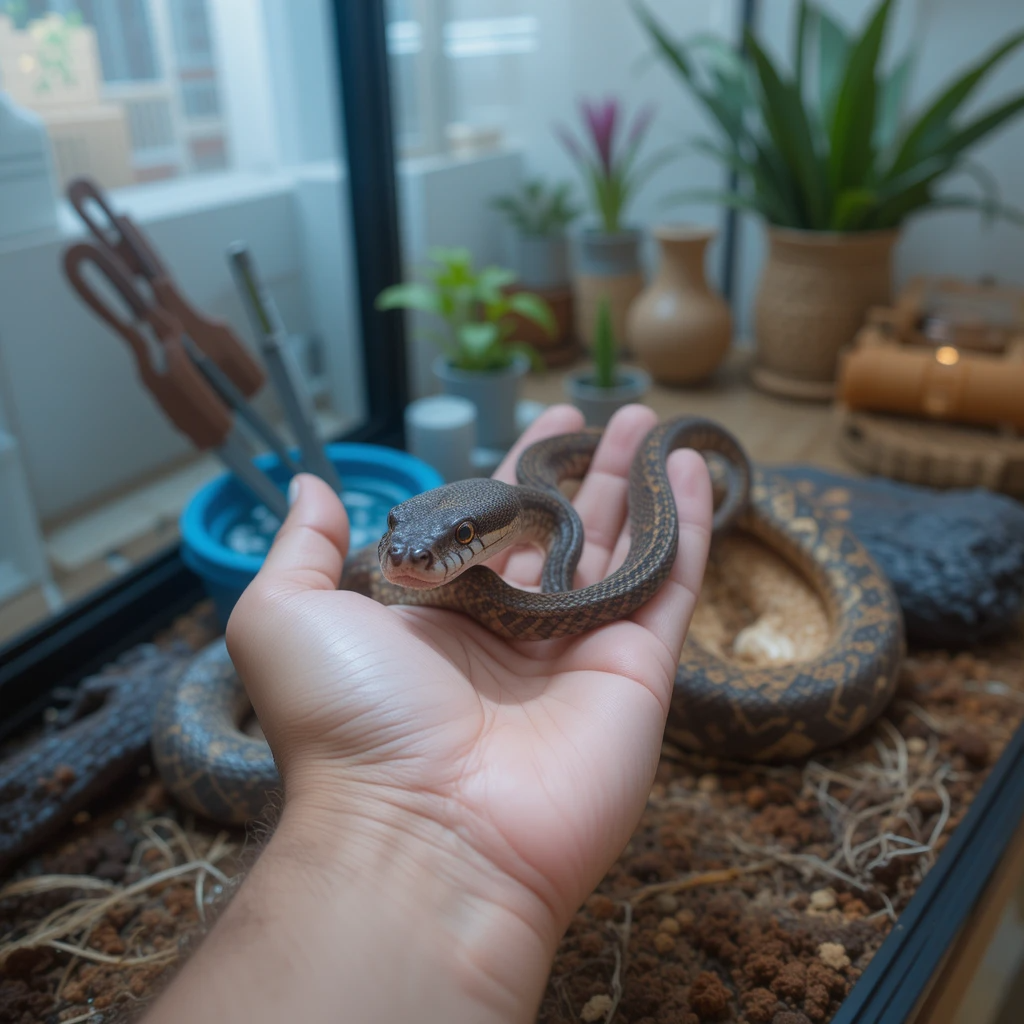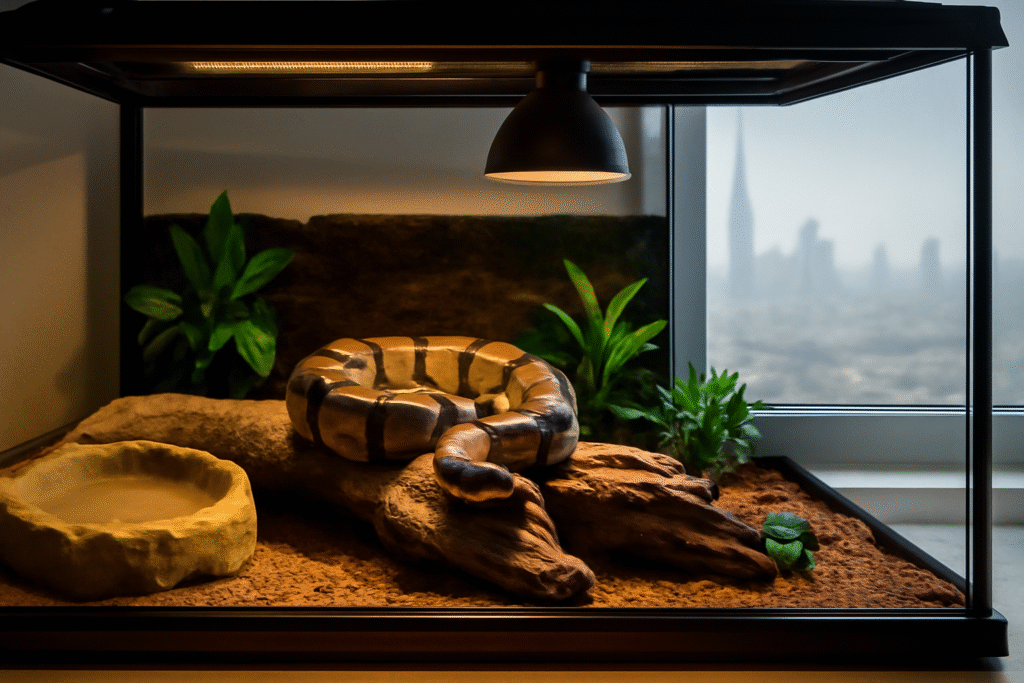Are you considering getting a pet snake in the UAE? This comprehensive guide covers everything you need to know about snakes commonly kept as pets, where to find snakes for sale, and how to provide proper care for your new reptile companion. Whether you’re looking for your first pet snake or adding to your collection, this article will help you navigate the world of snake ownership in Dubai, Ajman, Sharjah, and throughout the UAE.
What Makes Snakes Great Pets for UAE Residents?
Snakes have become increasingly popular as pets in the UAE, and for good reason. These fascinating reptiles offer a unique pet ownership experience that differs significantly from traditional pets like cats and dogs. Snakes are generally low-maintenance pets that don’t require daily walks or constant attention. Many snake species can thrive in the climate conditions similar to those found naturally in the UAE, making them well-suited to the region.
The pet trade for snakes has grown substantially in recent years, with more species becoming available through reputable breeders and pet stores. For busy UAE residents, a snake can be an ideal pet due to their relatively simple care requirements compared to other exotic pets. Many snake species only need feeding once a week or less, making them suitable for those with hectic schedules.
Additionally, many commonly kept snakes have docile temperaments when properly handled, allowing for interesting interaction without the neediness of traditional pets. With proper husbandry and care, most pet snakes can live for many years, providing long-term companionship for dedicated owners.
Which Snake Species Are Best for First-Time Owners?
For those getting a pet snake for the first time, choosing the right species is crucial. The best pet snake for beginners should be relatively docile, have straightforward care requirements, and be readily available from reputable sources. Corn snakes are widely considered ideal for beginners due to their manageable size, generally calm temperament, and simple husbandry needs. These colorful snakes are commonly kept as pets worldwide and adapt well to captivity.
Ball pythons are another excellent choice for your first snake. These snakes are known for their docile nature and manageable size, typically reaching only 3-5 feet in length. They have earned their name from their defensive behavior of curling into a ball when stressed, rather than becoming aggressive. Ball pythons are relatively easy to handle and have become one of the most popular pet snake species globally.
King snakes and milk snakes also make great beginner snakes. These species are generally hardy, active enough to be interesting, but not so active that they’re difficult to handle. They’re known for their beautiful patterns and colors, with the milk snake often displaying vibrant red, black, and yellow bands. Both species adapt well to captivity and are generally easy to care for with the right setup.
Where Can You Buy Snakes in Dubai, Sharjah, and Ajman?

Finding snakes for sale in the UAE has become easier in recent years as the exotic pet market has expanded. If you’re looking to buy snakes online or in person, several reputable establishments offer healthy, captive-bred specimens. Reptilia is one such retailer that offers various snake species, including corn snakes, king snakes, and milk snakes. They provide free shipping and are considered a trusted source for reptiles and supplies in the UAE.
Pet Corner Dubai is another option for those looking to purchase snakes, offering corn snakes (Pantherophis guttatus) among their selection of reptiles. Amazing Pets Life also carries a variety of reptiles, including king snakes and other species that can be purchased online in Dubai.
When buying a snake, always prioritize captive-bred specimens over wild-caught ones. Captive-bred snakes typically have better temperaments, fewer health issues, and are more likely to thrive in captivity. Additionally, purchasing from a reputable breeder or store ensures you’re getting a healthy animal with proper documentation.
How Much Does It Cost to Own a Pet Snake in the UAE?
The cost of snake ownership extends beyond the initial purchase price. When getting a pet snake, you’ll need to budget for the snake itself, its enclosure, heating and lighting equipment, substrate, hides, and ongoing expenses like food and veterinary care.
The price of snakes varies significantly by species. For example, a common corn snake might cost around AED 900, while specialty morphs or rarer species can cost several thousand dirhams. Palmetto corn snakes, for instance, are priced at AED 2,300 at some retailers. Albino variants like the Albino Emoryi corn snake may cost around AED 1,500.
Setting up a proper enclosure is another significant expense. A suitable terrarium with appropriate heating, lighting, substrate, and decorations can cost anywhere from AED 500 to several thousand dirhams depending on size and quality. Ongoing costs include food (typically frozen rodents that need to be thawed before feeding), which might cost AED 10-30 per meal depending on prey size, and occasional veterinary visits, which can be costly as not all vets specialize in reptile care.
What Equipment Do You Need for Your New Snake?
Creating the right environment for your pet snake is essential for its health and wellbeing. The enclosure is the foundation of proper snake husbandry. For most commonly kept snakes, a glass terrarium with a secure lid is suitable. The size should allow the snake to stretch out to at least two-thirds of its length along one side.
Temperature and humidity control are crucial aspects of snake care. Most snakes require a temperature gradient within their enclosure, with a warm side and a cooler side. This allows them to thermoregulate by moving between areas as needed. Heating can be provided through under-tank heaters, ceramic heat emitters, or heat lamps, depending on the species’ requirements.
Substrate choices vary by species, with options including aspen shavings, cypress mulch, or reptile-specific bedding. Some burrowing species like kenyan sand boas need deeper substrate to satisfy their natural behaviors. Hides are essential for a snake’s security and stress management – provide at least two, one on the warm side and one on the cool side of the enclosure.
Water dishes should be large enough for the snake to soak if desired, particularly for species that require higher humidity. Additional equipment might include thermometers, hygrometers, and specialized lighting for some species.
How Do You Feed a Pet Snake Properly?
Feeding is one of the most important aspects of snake care. Most pet snakes are carnivores that primarily eat rodents in captivity. The size of prey items should be appropriate for the snake – generally, the prey should be approximately the same width as the widest part of the snake’s body.
Most pet snakes in the UAE will eat frozen-thawed rodents, which are safer than live prey that could potentially injure your snake. Never leave a live rodent unattended with your snake. To feed frozen prey, thaw it completely at room temperature or in warm water before offering it to your snake using feeding tongs.
Feeding frequency varies by species and age. Young snakes typically eat more frequently (every 5-7 days) while adult snakes might eat every 7-14 days or even less frequently for larger species. Ball pythons, corn snakes, and king snakes generally adapt well to a regular feeding schedule, though some species like ball pythons may occasionally refuse meals, especially during seasonal changes.
Always wash your hands thoroughly after handling prey items and before handling your snake to avoid confusing your pet into thinking your hand is food. This helps prevent accidental bites during handling sessions.
What Health Issues Should Snake Owners Watch For?
Maintaining your snake’s health requires vigilance and knowledge of common issues. Respiratory infections are among the most common health problems in captive snakes, often resulting from improper temperature or humidity levels. Symptoms include wheezing, bubbling around the mouth or nostrils, and open-mouth breathing.
Mites and ticks are external parasites that can plague pet snakes. These tiny pests appear as small moving dots on your snake or in the enclosure. Internal parasites are also common, especially in wild-caught specimens, highlighting the importance of purchasing captive-bred snakes.
Mouth rot (infectious stomatitis) presents as inflammation, redness, or cheesy discharge in the mouth. Scale rot occurs when scales become damaged due to unsanitary conditions or excessive humidity, appearing as discolored, raised, or blistered scales.
Regular veterinary check-ups with a reptile veterinarian are essential, though finding a qualified exotic pet veterinarian in the UAE may require some research. Always quarantine new snakes before introducing them to existing collections to prevent disease spread.
How Do You Handle Your Pet Snake Safely?
Proper handling techniques are crucial for both your safety and your snake’s wellbeing. Always wash your hands before handling to remove any food scents that might trigger a feeding response. Support your snake’s body adequately, never grabbing or restraining it by the neck or tail.
Start with short handling sessions (5-10 minutes) for new snakes, gradually increasing duration as the snake becomes accustomed to you. Never handle a snake immediately after feeding, as this can cause regurgitation. Wait at least 48 hours after a meal before handling.
Be aware that even docile snake species can become stressed if handled too frequently. Most pet snakes tolerate handling 1-3 times per week for short periods. Watch for signs of stress such as rapid breathing, tense muscles, or defensive postures, and return the snake to its enclosure if these occur.
Some species, like green tree pythons, are more display pets than handling pets, while others like corn snakes and ball pythons generally tolerate regular handling well when properly acclimated.
Are Snakes Legal to Keep as Pets in the UAE?
The legality of keeping snakes as pets in the UAE varies depending on the species and local regulations. Generally, non-venomous species commonly kept in the pet trade are legal to own in Dubai, Sharjah, and Ajman. However, venomous snakes like coral snakes or species that eat other snakes may be restricted or require special permits.
Before purchasing any snake, research the specific legal requirements for your emirate. Some buildings or housing communities may have their own restrictions on exotic pets, so check your lease or community guidelines as well.
Importing snakes into the UAE requires proper documentation and may be subject to quarantine requirements. Working with established local retailers like Reptilia or Pet Corner Dubai can help ensure you’re purchasing legally obtained specimens that are permitted in your area.
How Do You Find a Qualified Veterinarian for Your Snake?
Finding veterinary care for exotic pets like snakes can be challenging in the UAE, but it’s essential for your pet’s health. Look for veterinarians who specifically mention experience with reptiles or exotic pets. Some clinics may have a veterinarian who specializes in exotic animals even if it’s not their primary focus.
Ask for recommendations from other snake owners, reptile specialty stores, or online exotic pet communities specific to the UAE. When you find a potential veterinarian, ask about their experience with your specific snake species before scheduling an appointment.
Establish a relationship with a veterinarian before emergencies arise. Consider scheduling a wellness check when you first acquire your snake to establish baseline health parameters and discuss proper husbandry techniques specific to your situation.
Keep detailed records of your snake’s behavior, feeding, shedding, and growth to share with your veterinarian during visits. This information can be valuable for diagnosing potential issues and tracking your pet’s development over time.
Why Choose AL MANAMA PEST CONTROL for Snake-Related Issues?

While this article focuses on pet snakes, it’s worth noting that wild snakes can sometimes become unwelcome visitors in UAE homes and businesses. If you encounter unwanted snakes on your property, professional snake control services are essential for safe removal.
AL MANAMA PEST CONTROL offers comprehensive snake control services throughout Dubai, Ajman, Sharjah, and the UAE. Their experienced technicians are trained to identify different snake species and implement effective, humane removal strategies. Unlike DIY approaches that can be dangerous, professional snake control ensures the safety of both humans and the snakes themselves.
The company employs integrated pest management techniques that not only remove existing snakes but also address the factors attracting them to your property. This might include sealing entry points, removing potential hiding spots, and controlling rodent populations that serve as food sources for wild snakes.
For those concerned about wild snakes around their property, contact AL MANAMA PEST CONTROL at +971 56 128 4346 or email info@almanamapestuae.com. Their team serves the entire UAE from their location at Bu Tena – Al Sharq – Sharjah – United Arab Emirates.
Essential Pet Snake FAQs: Choosing, Buying & Caring for Your First Snake
Considering a pet snake? This guide covers everything from beginner-friendly species to proper care requirements and purchasing options.
What Are the Best Snake Species for Beginners?
Corn snakes, ball pythons, and king snakes make excellent first pets due to their docile nature and manageable size. Milk snakes and hognoses are also good options that are commonly bred in captivity.
How Much Space Does a Pet Snake Need?
Enclosures should be at least twice the length of your adult snake with secure lids as snakes are excellent escape artists. Include proper heating, hiding spots, and water bowl large enough for soaking.
What Do Pet Snakes Eat?
Most pet snakes eat pre-killed mice or rats. Young snakes eat weekly while adults typically eat every 1-2 weeks. Ball pythons can be picky eaters, while rat snakes may accept varied prey.
Where Can I Buy Snakes Online or In-Person?
Purchase from reputable breeders, reptile expos, specialty pet stores, or trusted online retailers. Avoid wild-caught specimens and ensure snakes are active, alert, and eating regularly before buying.
How Much Does It Cost to Own a Pet Snake?
Initial setup costs $200-400 including enclosure, heating, and accessories. The snake itself ranges from $30-300+ depending on species and morph. Ongoing costs include food, substrate, and veterinary care.
What Health Issues Should I Watch For?
Monitor for respiratory infections, shedding problems, mites, and unusual behavior. Find a vet experienced with reptiles before your new pet arrives home.
How Do I Handle My Pet Snake Safely?
Let the snake acclimate for a week before handling. Support its body properly and never grab near the head. Start with short sessions and avoid handling after feeding or during shedding.
Are There Legal Requirements for Keeping Snakes?
Many locations restrict certain species, particularly large constrictors like Burmese pythons or venomous snakes. Research local laws before purchasing, as snakes native to your area may be protected.
How Long Do Pet Snakes Live?
Most common pet snakes live 15-25 years with proper care. Corn snakes typically live 15-20 years, while ball pythons can reach 30+ years, making them a significant long-term commitment.
How Do I Set Up a Proper Snake Enclosure?
Provide appropriate substrate, temperature gradient (75-85°F), hiding spots, and proper humidity levels. Green tree pythons and other arboreal species need vertical space and branches for climbing.
- Choose species based on your experience level and commitment
- Never release pet snakes into the wild
- Purchase captive-bred specimens from reputable sources
- Ensure secure enclosures to prevent escapes
- Research proper care specific to your chosen species
Important Things to Remember About Pet Snake Ownership
- Research thoroughly before getting a pet snake – different species have different care requirements, temperaments, and lifespans
- Purchase captive-bred snakes from reputable sources like Reptilia or Pet Corner Dubai for healthier, better-adapted pets
- Set up the proper enclosure with appropriate heating, substrate, and hides before bringing your snake home
- Establish a relationship with a veterinarian experienced in reptile care for regular check-ups and emergencies
- Feed appropriately sized, thawed rodents using feeding tongs to avoid accidental bites
- Handle your snake gently and consistently, supporting its body properly and respecting signs of stress
- Monitor temperature and humidity levels daily to prevent health issues
- Keep detailed records of feeding, shedding, and behavior to track your snake’s health
- Research local regulations regarding snake ownership in your specific emirate
- Consider professional help from AL MANAMA PEST CONTROL (+971 56 128 4346) for any unwanted wild snake encounters
Remember that snake ownership is a long-term commitment, with many species living 15-30 years with proper care. By choosing an appropriate species, providing excellent husbandry, and working with qualified professionals when needed, you can enjoy a rewarding relationship with your pet snake for many years to come.



